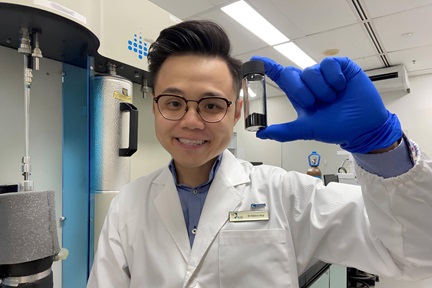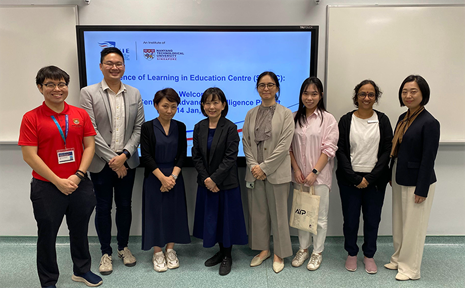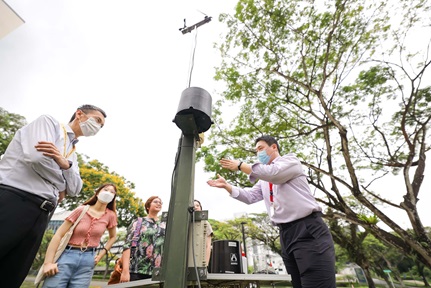How high is your household food resilience?
It is important to know how to make the best use of available food to whip up tasty and nutritious meals, says Dr Johannah Soo from the National Institute of Education, Nanyang Technological University, Singapore.
Remember how people rushed to supermarkets island-wide to stock up on food when Singapore entered the state of Dorscon Orange and, subsequently, the circuit breaker?
Such incidences of panic food buying in Singapore, and also around the world, are an indicator of what is known as “low household food resilience”, says Dr Johannah Soo, a Food and Consumer Sciences (FCS) lecturer at the National Institute of Education, Nanyang Technological University, Singapore (NIE NTU, Singapore).
She adds that the concept of food resilience looks at how well communities and families adapt to food availability, and how they cope with food crises and uncertainties related to global food supply.
An example of food resilience at the community and family level is knowing how to make the best use of available food resources to serve nutritious meals. During the circuit breaker period, for example, the supply of fresh food was threatened, and supermarkets were frequently swept clean of items. Thus, having food resilience means knowing how to work with other available types of food to ensure families are able to enjoy a balanced and nutritious diet.
“Simply put, food resilience means, are you ready for a food crisis?” stresses Dr Soo.
Raising a relevant issue
Dr Soo started keenly researching this topic several years ago, and her findings have never been more relevant than now, in the face of the pandemic.
Her research highlighted the need to promote a nationwide initiative in creating greater awareness and preparedness in building food resilience within each household. And in an article in The Straits Times published on May 1 last year, she urges the authorities to do so.
“Covid-19 is a wake-up call,” she says, adding that it is very important to look into household food resilience in Singapore because the country imports 90 per cent of its food supplies.
Strengthening knowledge in food resilience
Currently, Dr Soo trains future Nutrition and Food Science educators at NIE NTU, Singapore. Even though the concept of household food resilience is not a core feature in the syllabus she teaches, she is studying the area in her personal capacity. It stems from her own interest in the field of food science and consumerism.
This endeavour is complemented by skills and knowledge she picked up through her Master of Education in Educational and Psychological Measurement and Evaluation degree — now known as Master of Education in Educational Assessment — and her PhD in Food and Consumer Sciences, both of which she obtained from NIE NTU, Singapore.
“Personally, I feel that through the master’s programme, I have learnt to undertake different types of research, which developed my analytical and evaluation skills,” she says.
It may come as a surprise to some, but NIE NTU, Singapore’s higher degree courses — master’s degrees by coursework or research work, and doctorate degrees — are not just for educators, but working professionals and international students too.
NIE NTU, Singapore offers a vast and diverse collection of master’s level courses to promote lifelong learning for individuals to acquire knowledge and skills mastery.
Dr Soo, for example, has taught students from the food industry and medical fields in her master’s classes. Also, students pursuing higher degrees in other fields can minor in her courses as complementary modules.
She explains: “Some courses are intended to provide content mastery or upgrading. Doing a master’s or PhD degree allows a person to specialise in their field of study or professional practice.”
Most importantly, she adds, the bulk of higher degree programmes provides the opportunity for students to learn higher-order thinking skills. Candidates can learn skills such as how to synthesise and create new information in the course of doing a PhD.
“In this current time, knowledge is so easily available, but it is crucial to have the skills to evaluate and synthesise new information so that we can continue the advancement of society,” she adds.
If you are inspired by Dr Soo to pursue a particular area of interest, or looking to re-skill or up-skill to stay relevant at work, consider letting a higher degree at NIE NTU, Singapore pave the way for you.
Modular Graduate Courses for busy professionals
Torn between the need to upgrade yourself through further education, but worried about the long-term commitment required to complete a full higher degree programme?
Opt for one of NIE NTU, Singapore’s Modular Graduate Courses (MGCs) — standalone master’s level courses that can be taken at your own pace. They allow further enhancement or specialisation of knowledge beyond a basic degree.
Credits earned from these standalone courses can also be stacked towards a microcredential, such as the NTU MiniMastersTM. Furthermore, the credits from the standalone courses may even be transferred to a relevant master’s programme, subject to prevailing university’s guidelines and approval.
Many of these MGCs are also funded by SkillsFuture Singapore.
Learn more about NIE NTU, Singapore’s higher degree programmes, Modular Graduate Courses (MGCs) and the NTU MiniMastersTM.
Read the original article here.
Source: The Straits Times © Singapore Press Holdings Limited. Permission required for reproduction


.tmb-listing.jpg?Culture=en&sfvrsn=a2d9f5f9_1)


